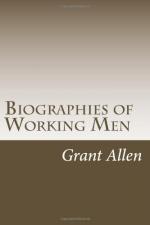At Langholm, a Scotch country town of the quietest and sleepiest description, Tam Telford passed the next eight years of his uneventful early life, first as an apprentice, and afterwards as a journeyman mason of the humblest type. He had a good mother, and he was a good son. On Saturday nights he generally managed to walk over to the cottage at Westerkirk, and accompany the poor widow to the Sunday services at the parish kirk. As long as she lived, indeed, he never forgot her; and one of the first tasks he set himself when he was out of his indentures was to cut a neat headstone with a simple but beautiful inscription for the grave of that shepherd father whom he had practically never seen. At Langholm, an old maiden lady, Miss Pasley, interested herself kindly in Janet Telford’s rising boy. She lent him what of all things the eager lad most needed—books; and the young mason applied himself to them in all his spare moments with the vigorous ardour and perseverance of healthy youth. The books he read were not merely those which bore directly or indirectly upon his own craft: if they had been, Tam Telford might have remained nothing more than a journeyman mason all the days of his life. It is a great mistake, even from the point of view of mere worldly success, for a young man to read or learn only what “pays” in his particular calling; the more he reads and learns, the more will he find that seemingly useless things “pay” in the end, and that what apparently pays least, often really pays most in the long run. This is not the only or the best reason why every man should aim at the highest possible cultivation of his own talents, be they what they may; but it is in itself a very good reason, and it is a sufficient answer for those who would deter us from study of any high kind on the ground that it “does no good.” Telford found in after-life that his early acquaintance with sound English literature did do him a great deal of good: it opened and expanded his mind; it trained his intelligence; it stored his brain with images and ideas which were ever after to him a source of unmitigated delight and unalloyed pleasure. He read whenever he had nothing else to do. He read Milton with especial delight; and he also read the verses that his fellow-countryman, Rob Burns, the Ayrshire ploughman, was then just beginning to speak straight to the heart of every aspiring Scotch peasant lad. With these things Tam Telford filled the upper stories of his brain quite as much as with the trade details of his own particular useful handicraft; and the result soon showed that therein Tam Telford had not acted uncannily or unwisely.




